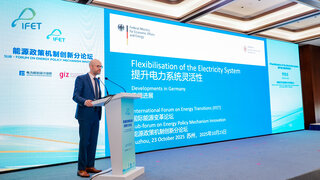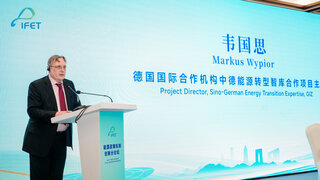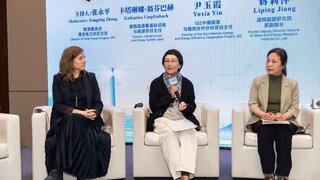German Expertise Enriches Global Dialogue on Energy Transition
German Experience and Best Practice Sharing at the 2025 International Forum on Energy Transition (IFET)
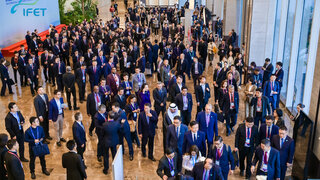
From 23-24 October 2025, the International Forum on Energy Transition (IFET) took place in Suzhou, Jiangsu Province. Co-hosted biennially by the National Energy Administration (NEA), the Jiangsu Provincial Government and the International Renewable Energy Agency (IRENA). As one of China’s most influential platforms for international dialogue on the global energy transition, the IFET forum convened high-level representatives from energy authorities, international organisations, enterprises, financial institutions, research institutes and industry associations to discuss global energy security, clean energy development and the advancement of a global clean energy partnership. Its significance in China is comparable to that of the Berlin Energy Transition Dialogue (BETD) organised annually by the German Federal Government.
Germany Insights Shape the Global Energy Transition Dialogue
At this year’s forum, Germany’s in-depth participation added valuable international perspectives and practical lessons to the discussions. German representatives contributed expertise on policy design, market mechanisms, renewable energy integration, and carbon management strategies — underlining Germany’s commitment to advancing a sustainable global energy transition and promoting exchange with China and international partners.
Representatives from the German Federal Ministry for Economic Affairs and Energy (BMWE), the German Embassy in Beijing, the Deutsche Gesellschaft für Internationale Zusammenarbeit (GIZ), and the Deutsche Energie-Agentur (dena) contributed to multiple sub-forums and side events.
Their inputs highlighted Germany’s latest progress and policy approaches in the energy transition — from flexible power system design and renewable energy integration to carbon management strategies.
Key Highlights
- Power System Flexibility: At the Energy Policy Mechanism Innovation Subforum, representative from the German Federal Ministry for Economic Affairs and Energy (BMWE) shared Germany’s experience on enhancing flexibility in electricity markets and power grids to integrate a growing share of renewables. As part of the launch of outcomes, the China Electric Power Planning and Engineering Institute (EPPEI) and the Deutsche Gesellschaft für Internationale Zusammenarbeit (GIZ) signed a “Memorandum of Understanding on Cooperation for the Green Transition of the Power System”.
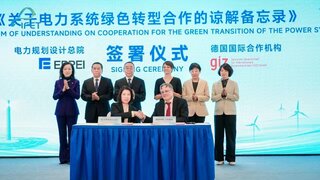
- Hydrogen Development and Trade: Expert from GIZ joined the panel discussions of the hydrogen subforum and presented the hydrogen policy and industry development in Germany, outlining the key findings from Germany’s recent Energy Transition Monitoring Report.
- Policy Dialogue and Exchange: During a side event on the release of the joint report “China & Germany’s Clean Energy Transition”, experts from GIZ and dena presented the German experience and compared approaches to balancing the “energy trilemma” of security, affordability and climate protection, underscoring the value of mutual learning in designing decarbonisation pathways and market mechanisms.
- Renewable Energy Consumption and Market Incentives: At the Global Renewable Energy Development Subforum, GIZ expert shared policy experiences in promoting green electricity use, improving certificate systems and incentivising broader market participation.
- Carbon Capture, Utilisation and Storage (CCU/CCS): Expert from dena provided insights into recent policy developments in Europe and Germany, outlining both challenges and opportunities in advancing CCU/CCS as a key transition technology.
Fostering Mutual Learning and Sustainable Cooperation
Through such high-level exchange formats, Germany’s pioneering energy transition experiences are shared with Chinese and international policymakers and energy experts to inspire effective policy design and implementation worldwide.
In cooperation with China under the Sino-German Energy Partnership, Germany and China continue to share and learn from each other’s sustainability solutions, jointly contributing to the energy transition in both countries. At the same time, these exchanges support the creation of a level playing field for foreign trade in the clean energy sector, fostering innovation across global energy markets and contributing climate protection across borders.
See below picture options (All Photos by: 2025 IFET):
